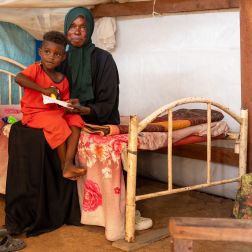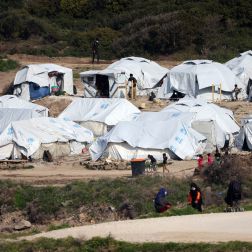- 4 mins read time
- Published: 9th July 2014
Keira Knightley shines spotlight as crisis spirals in South Sudan
This week, on the third anniversary of South Sudan’s independence, actress Keira Knightley has called for support for Oxfam Ireland’s appeal for South Sudan after witnessing first-hand the desperate plight of families struggling to survive.
Here, Colm Byrne, Oxfam Ireland’s Humanitarian Manager, explains how the humanitarian crisis is spiralling out of control as funds dry up.
Year in and year out the subsistence farmers of South Sudan, the world’s newest state, pray for the timely start of the rainy season. Without it, there is no water for them or their animals to drink, the land hardened by the preceding dry season cannot be cultivated, seeds cannot be sown, nor food produced or surplus food sold for a small profit.

Above: Keira Knightley visits Bor Camp in South Sudan. Upper-left: Keira meets Rebecca age 25 in Bor Camp, South Sudan. Rebecca ran from Bor in December when fighting broke out. She was caught in an ambush, questioned about her husband and beaten. She lost her children but was reunited with them in the camp.One of her children had measles and nearly did not survive. She lost her husband in the April ambush. She is alone and scared of how she will bring up her children without her husband. Lower-right: Keira meets with Nyandow Nhial Khor, 18 years old. With her first child, of two months old Buomkuoth Gatkuotch, who she gave birth to in the camp. The baby is being treated for malaria, which they caught from the water in the camp. Photo: Abbie Trayler-Smith
For Elizabeth, who has sought refuge from fighting in a camp for people who are displaced in the northern town of Malakal, the onset of the rains have still greater significance following six months of conflict between forces loyal to President Salva Kiir and those of his former Vice-President Riek Machar.
Now, many of South Sudan’s well-travelled but unsurfaced roads that form the arteries and veins of the country’s economy are left water logged and largely impassable so stalling, even if peace talks haven’t done so yet, the movement of heavy military equipment and any ambitions either side may have of making new ground.
But while the rains may have quelled the guns somewhat and provided hope of some temporary respite, they have now also served a still further blow to Elizabeth, flooding the meagre shelter she must now call home in the camp. She beckons us over to look more closely…..no easy task as we struggle to travel the short distance through thick sticky mud that threatens to spill over into our boots. Bring wellington boots, they said... fisherman’s waders would have been more appropriate.

Above: Internally displaced people queue inside the camp at UN House in Juba, South Sudan. Oxfam, alongside other agencies, is distributing food and charcoal vouchers for over 13,000 people across a two week period. Photo: Kieran Doherty / Oxfam
We make no graceful entrance as our stumbling efforts are met with a mixture of humour and anger, both welcoming of our enthusiasm but anxious that we too should understand what it is to have challenged that most basic of rights, human dignity.
Atop a single spring bed sit under a sagging tarpaulin sheet her two young children clinging on as though cast adrift at sea. Just inches below, the thick grey stagnant water threatens while all around the family’s simple belongings are stacked on whatever objects can stand alone or be combined to raise them above water. It seems more accurate to say not that the house is flooded but that it in effect stands in water. Life incredibly goes on despite everything, but nobody deserves to live like this.
As we stand aghast, we are joined by Elizabeth’s neighbours, all anxious that we should bare testimony to their plight too. The smell they tell us is intolerable, we can only but agree, and we are invited to visit more shelters at which point we realise our feet are stuck and cling on to anything we can to provide leverage. Our humiliation at least is only temporary…

Above: Colm Byrne, Oxfam Ireland's Humanitarian Manager working in Malakal, South Sudan. Photo: Sorcha Nic Mhathúna / Oxfam
As we leave, adjacent to us, two women and a man hoist their clothing and move thigh deep to higher ground. Ahead of them a small boy has somehow made the same journey carrying his younger sister. Not all are so able bodied or feel sufficiently secure to even consider attempting such a trip especially at night when the risk of attack is great.
This is where thousands just like Elizabeth and her children displaced by the conflict have come for protection by the international community yet to provide more than half of the aid promised to address South Sudan’s humanitarian crisis.
This is where they have come to seek food as a food crisis threatens to turn into a catastrophe affecting some 7 million people.
This is where they have come to wait in safety for news of separated family members.
This is where they have come for hope that soon their political leaders will act in their best interests to provide a swift political solution to end the fighting.
And this is why we at Oxfam are responding to humanitarian needs in South Sudan now and calling for all those with influence to help end this suffering now.




